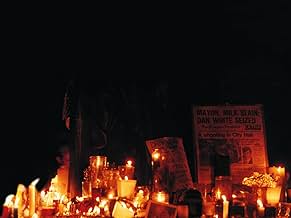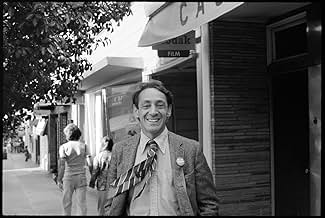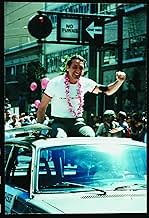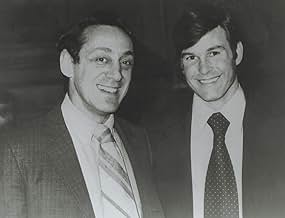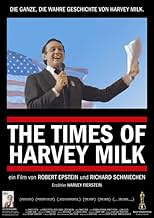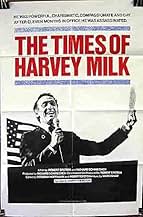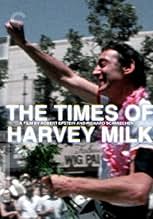VALUTAZIONE IMDb
8,2/10
6943
LA TUA VALUTAZIONE
Aggiungi una trama nella tua linguaA documentary of the successful career and assassination of San Francisco's first elected gay city supervisor.A documentary of the successful career and assassination of San Francisco's first elected gay city supervisor.A documentary of the successful career and assassination of San Francisco's first elected gay city supervisor.
- Regia
- Sceneggiatura
- Star
- Vincitore di 1 Oscar
- 11 vittorie e 2 candidature totali
Harvey Fierstein
- Narrator
- (voce)
Harvey Milk
- Self
- (filmato d'archivio)
John Briggs
- Self
- (filmato d'archivio)
Jerry Brown
- Self
- (filmato d'archivio)
Jimmy Carter
- Self
- (filmato d'archivio)
Dianne Feinstein
- Self
- (filmato d'archivio)
- (as Mayor Dianne Feinstein)
David Fowler
- Self - TV Interviewer of Dan White
- (filmato d'archivio)
Joseph Freitas
- Self
- (filmato d'archivio)
Terence Hallinan
- Self
- (filmato d'archivio)
George Moscone
- Self
- (filmato d'archivio)
Recensioni in evidenza
10PDWadler
This is a very important film, documenting the coming-of-age of LGBT involvement in the political process. Made just a few years after the Milk/ Moscone assassinations, it expertly captures the mood of a community, pre-AIDS, poised to assume political power.
The climax of the film is the peaceful, strangely silent, candle-lit march up Market Street from the Castro, the center of San Francisco's gay male community. The gay community's response to horrific violence is shock and love. When I show this film to young (mostly heterosexual) student audiences, there is always a collective gasp as they see the throngs of silent marchers.
The climax of the film is the peaceful, strangely silent, candle-lit march up Market Street from the Castro, the center of San Francisco's gay male community. The gay community's response to horrific violence is shock and love. When I show this film to young (mostly heterosexual) student audiences, there is always a collective gasp as they see the throngs of silent marchers.
10bandw
The title of this excellent documentary is well chosen, since it is as much about a time and a place as it is about Harvey Milk. The time is the late 1970s and the place is San Francisco. After quickly covering some biographic details the movie concentrates on Milk's campaign to get elected to the San Francisco Board of Supervisors. After three unsuccessful attempts he wins, becoming the first openly gay man to be so elected. As much of a breakthrough as that was, it must be kept in mind that Milk was elected representing a heavily gay district.
Things have changed a lot in thirty years, since some U.S. congressmen are now openly gay. But the issue of acceptance of homosexuality is still contentious, as proved by the passage in 2008 of Proposition 8 that changed the California Constitution to ban gay marriage. This documentary is relevant since it shows where things started to change.
A good part of the film is devoted to consideration of California's Proposition 6 that was put before the public in 1978. Proposition 6 would have banned gays and lesbians from working in public schools. Of course Milk was heavily involved in opposition to the Proposition and it was a peak moment for him and the gay community when the proposition failed. The filming of the celebration of this in the gay community is a high point of the film.
It was only shortly after the defeat of Proposition 6 that Milk and San Francisco Mayor George Moscone were assassinated by Dan White, a fellow supervisor who had recently resigned, but was seeking reinstatement. The spontaneous candlelight vigil on the evening of the assassination that comprised some 40,000 people marching from the Castro neighborhood to City Hall was captured on film from the roof of a nearby building and is an exceedingly moving emotional highlight of the film.
This film is clearly tilted to present Milk in a favorable light and indeed that is not difficult, since Milk's charisma comes across strongly. However, it is mentioned that Milk was subject to fits of anger and could be difficult to work with. Also, Dan White's anguished testimony at his trial is played and he seemed genuine in his expression of regret, but hardly enough to exonerate him in the minds of most people. When White got what was considered a light seven year sentence, the ugly rioting and vandalism that resulted were not whitewashed. White was released from prison after serving five and a half years and committed suicide less than two years later. So, in the end he paid the price for his crimes.
The interviews with some of Milk's associates almost ten years after his assassination are very effective. They are all articulate and insightful about themselves and the history of the times of Harvey Milk.
The use of documentary footage from the time is effective and either a gay or a straight can appreciate this documentary as history.
Things have changed a lot in thirty years, since some U.S. congressmen are now openly gay. But the issue of acceptance of homosexuality is still contentious, as proved by the passage in 2008 of Proposition 8 that changed the California Constitution to ban gay marriage. This documentary is relevant since it shows where things started to change.
A good part of the film is devoted to consideration of California's Proposition 6 that was put before the public in 1978. Proposition 6 would have banned gays and lesbians from working in public schools. Of course Milk was heavily involved in opposition to the Proposition and it was a peak moment for him and the gay community when the proposition failed. The filming of the celebration of this in the gay community is a high point of the film.
It was only shortly after the defeat of Proposition 6 that Milk and San Francisco Mayor George Moscone were assassinated by Dan White, a fellow supervisor who had recently resigned, but was seeking reinstatement. The spontaneous candlelight vigil on the evening of the assassination that comprised some 40,000 people marching from the Castro neighborhood to City Hall was captured on film from the roof of a nearby building and is an exceedingly moving emotional highlight of the film.
This film is clearly tilted to present Milk in a favorable light and indeed that is not difficult, since Milk's charisma comes across strongly. However, it is mentioned that Milk was subject to fits of anger and could be difficult to work with. Also, Dan White's anguished testimony at his trial is played and he seemed genuine in his expression of regret, but hardly enough to exonerate him in the minds of most people. When White got what was considered a light seven year sentence, the ugly rioting and vandalism that resulted were not whitewashed. White was released from prison after serving five and a half years and committed suicide less than two years later. So, in the end he paid the price for his crimes.
The interviews with some of Milk's associates almost ten years after his assassination are very effective. They are all articulate and insightful about themselves and the history of the times of Harvey Milk.
The use of documentary footage from the time is effective and either a gay or a straight can appreciate this documentary as history.
10Ozdachs
I felt it was a powerful film as I saw it as a new arrival in SF in 1984. I didn't understand its power, though, until the documentary ended and the theather kept the lights very low. As I got up and started walking to the exit, I realized that most of the audience kept their seats. Very odd, since the credits and EVERYTHING had ended. The folks were just sitting and crying.
Art has historically been used to let people rethink and understand the events of their times. (Think Shakespeare.) This film is that type of "art".
Art has historically been used to let people rethink and understand the events of their times. (Think Shakespeare.) This film is that type of "art".
Though I am a San Francisco Bay Area native, I have no memory of Harvey Milk's career, being as I was only 6 when he was assassinated. However, watching this film made me feel as if I was there, seeing everything as it happened. It truly is that powerful and involving.
Director Robert Epstein skillfully alternate between archival news footage and interviews with Milk's friends and associates, who recall him with warmth and affection. This isn't a hagiography (Milk was, as his former campaign manager notes, hot-tempered and sometimes very hard to work with), it's merely a straightforward portrait of a fascinating and inspirational man.
Harvey Milk was charming, intelligent, articulate, and above all, tenacious. It was largely due to his efforts and those of his supporters that the Briggs Initiative, which would've restricted the rights of gay teachers, was defeated in California. Though gay rights were understandably his biggest issue, he also fought for other disenfranchised groups, and shrewdly recognized that they should all come together as one to fight for human rights. He also presciently recognized the very real possibility that he could be murdered, and taped a statement which he requested be played only in the event of his death by assassination. It's eerie to listen to it, not least because he speaks in such a matter-of-fact way.
Epstein provides a surprising amount of balance with regards to Dan White, who shot both Milk and George Moscone. He certainly doesn't have sympathy with White's actions, but he makes sure to note that White had devoted his whole life to public service, that he gave up a secure job as a fireman to take a low-paying job as district supervisor, then quit in frustration. Nonetheless, his disgust for the ridiculously light sentence White received for murdering Milk and Moscone is palpable, and one interviewee posits that had White murdered only Moscone, he'd have been in San Quentin for the rest of his life.
White, by the way, committed suicide a year after being released from prison. Epstein thought about changing the ending of the film in order to mention this fact, but decided that to do so would be to shift the focus too much to White. The subject of this movie is Harvey Milk, and it's a beautiful tribute to him.
I do have one criticism: the filmmakers don't clear up the matter of the so-called "Twinkie defense," in which psychiatrists who testified for Dan White's defense allegedly claimed that his consumption of junk food was what caused his depression (which, his attorneys argued, was what led him to go on his killing rampage). What the psychiatrists actually claimed was that White consumption of junk food was a symptom, not the cause, of his depression.
Director Robert Epstein skillfully alternate between archival news footage and interviews with Milk's friends and associates, who recall him with warmth and affection. This isn't a hagiography (Milk was, as his former campaign manager notes, hot-tempered and sometimes very hard to work with), it's merely a straightforward portrait of a fascinating and inspirational man.
Harvey Milk was charming, intelligent, articulate, and above all, tenacious. It was largely due to his efforts and those of his supporters that the Briggs Initiative, which would've restricted the rights of gay teachers, was defeated in California. Though gay rights were understandably his biggest issue, he also fought for other disenfranchised groups, and shrewdly recognized that they should all come together as one to fight for human rights. He also presciently recognized the very real possibility that he could be murdered, and taped a statement which he requested be played only in the event of his death by assassination. It's eerie to listen to it, not least because he speaks in such a matter-of-fact way.
Epstein provides a surprising amount of balance with regards to Dan White, who shot both Milk and George Moscone. He certainly doesn't have sympathy with White's actions, but he makes sure to note that White had devoted his whole life to public service, that he gave up a secure job as a fireman to take a low-paying job as district supervisor, then quit in frustration. Nonetheless, his disgust for the ridiculously light sentence White received for murdering Milk and Moscone is palpable, and one interviewee posits that had White murdered only Moscone, he'd have been in San Quentin for the rest of his life.
White, by the way, committed suicide a year after being released from prison. Epstein thought about changing the ending of the film in order to mention this fact, but decided that to do so would be to shift the focus too much to White. The subject of this movie is Harvey Milk, and it's a beautiful tribute to him.
I do have one criticism: the filmmakers don't clear up the matter of the so-called "Twinkie defense," in which psychiatrists who testified for Dan White's defense allegedly claimed that his consumption of junk food was what caused his depression (which, his attorneys argued, was what led him to go on his killing rampage). What the psychiatrists actually claimed was that White consumption of junk food was a symptom, not the cause, of his depression.
I caught this on IFC a few weeks back. I've had the original Mark Isham score for years, and love that, but I never put any effort into finding and watching the film. It's wonderful. Even listening to Harvey Fierstein's voiceover doesn't get irritating because the subject matter is at once riveting and heartfelt, exuberant and crushing. The thing that makes this movie so effective, I think, is that it was clearly pieced together for a mixed audience. This is not a gay film, or a political film, or something only San Franciscans will understand. It brings you in and allows you to really see and hear how this man affected lives around him, including the life of the man who shot him. Fascinating. Haunting. Wonderful. Go see this film.
Lo sapevi?
- QuizSelected for preservation by the National Film Registry in 2012.
- BlooperWhen describing Harvey Milk's murder, the narrator states that Dan White killed Milk in Milk's own office. In reality, White asked Milk to come into White's former office, closed the door, blocked it with his body, and shot Milk.
- Citazioni
[last lines]
Harvey Milk: I know that you cannot live on hope alone, but without it, life is not worth living. And You... And You... And You... Gotta give em hope. Thank You very much.
- Colonne sonoreYou Make Me Feel (Mighty Real)
Performed by Sylvester
Written by Sylvester & James Wirrick (as Tip Wirrick)
Tim McKenna (Borozi Music Artists)
Fantasy Records
(c) 1978 Rights Donated
I più visti
Accedi per valutare e creare un elenco di titoli salvati per ottenere consigli personalizzati
- How long is The Times of Harvey Milk?Powered by Alexa
Dettagli
- Data di uscita
- Paese di origine
- Sito ufficiale
- Lingua
- Celebre anche come
- Wer war Harvey Milk?
- Luoghi delle riprese
- Aziende produttrici
- Vedi altri crediti dell’azienda su IMDbPro
Botteghino
- Lordo Stati Uniti e Canada
- 13.801 USD
- Fine settimana di apertura Stati Uniti e Canada
- 2213 USD
- 17 set 2000
- Lordo in tutto il mondo
- 46.573 USD
Contribuisci a questa pagina
Suggerisci una modifica o aggiungi i contenuti mancanti


